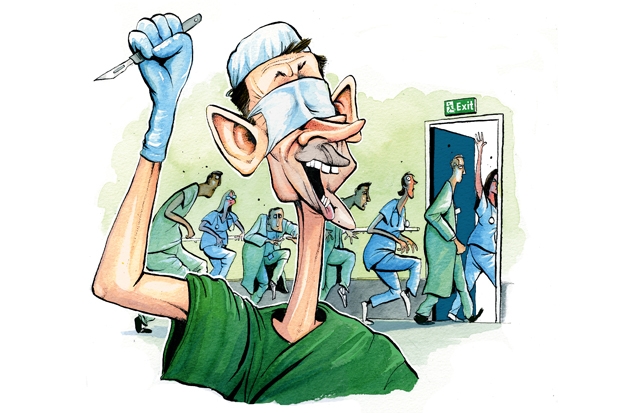The NHS and politicians
Sir: The NHS is indeed in need of fundamental reform, but Max Pemberton’s excellent article (‘The wrong cuts’, 14 November) exemplifies why politicians are least well qualified to conduct it. The public loves the NHS and has every reason to distrust political meddling. NHS England should become a public corporation with a five-year charter similar to that applying to the BBC. Of course politicians must decide the total budget and agree the strategic goals, but that is a far cry from deciding the pay and hours of every category of staff. Politicians have no managerial skills and should leave that to the professionals.
Tim Ambler
Cley next the Sea, Norfolk
What the young resent
Sir: I am a pensioner, but in my experience any resentment from the young (‘The war on pensioners’, 14 November) is directed less at our financial situation than at the increasingly difficult position they are put in by the housing market and the actions of successive governments. Those starting their working lives encounter a crippling financial burden, largely caused by three factors: 1) Starter house prices approach six times starter incomes, rather than around three times income 30 to 40 years ago. 2) At the time I entered the housing market, mortgage interest was tax-deductible at one’s marginal rate. 3) University tuition fees used to be paid by central or local government, and means-tested maintenance grants were available.
It is no wonder that it takes families the majority of their working lives to pay off these debts. There are many ways an enlightened government could alleviate this situation, but sadly we do not seem to be living in an age of enlightenment.
Mike Venis
Faversham, Kent
No friends of Dorothy
Sir: The Spectator evidently needs some gay men on its staff. The glorious Technicolor photograph (Arts, 14 November) shows Judy Garland not in 1944’s Meet Me in St Louis, but in the lesser-known The Pirate (1948), which had a score by Cole Porter.
Mark Bostridge
London NW3
Livingstone’s philistinism
Sir: I was strangely troubled to read Alexander Chancellor’s commentary on the growing destructive bent of some city mayors (Long Life, 7 November). For Ken Livingstone, as mayor, to have called for the removal of the statues of Generals Sir Charles Napier and Sir Henry Havelock in Trafalgar Square because they were ‘outdated symbols’ and ‘he didn’t know who they were’ put him in a similar camp to the radicals who destroyed Palmyra.
Napier will always be remembered for his notable despatch back to headquarters on conquering the Sindh Province in 1842: ‘Peccavi’, Latin for ‘I have sinned’. Although brutal in punishment, he endeared himself in India by furthering the cause of native officers, and various streets and buildings in Karachi and Quetta are still named after him. Henry Havelock gave his life defending Lucknow during the 1857 rebellion — a lasting example to officers and men following after him.
For Livingstone to have complained that ‘the people on the plinths in the main square of our capital city should be identifiable to the generality of the population’ is simply nonsense. These monuments bring history to life.
Tazi Husain
Chairman, Tempsford Memorial Trust, Bedford
Boarding school ‘extras’
Sir: I was tickled by Charles Moore’s musings on the ‘extras’ on boarding school termly bills (Notes, 24 October). When I was a housemaster, I was contacted by a Nigerian father expressing outrage at the £1,200 bill for extras that his son had racked up. We amicably resolved the matter when I pointed out that his entrepreneurial son had been buying items in bulk from the tuck shop as ‘extras’ during opening hours, and selling them on at a profit during closing hours to aid his cash flow.
Andrew Wilson
Eaglescliffe, Teesside
Our very own brain drain
Sir: It is hard to disagree with Will Butler-Adams’s cri de coeur in your excellent supplement on manufacturing (‘Let’s step it up a gear’, 7 November). But while he is being outbid for graduate talent by the likes of Dyson and Jaguar Land Rover, they in turn are being outbid by the financial services industry.
So long as investment banks and hedge funds continue to pay salaries that dwarf those available in manufacturing, the brightest and best engineers, physicists and mathematicians will flock to the Square Mile, where they will devote themselves to the questionable discipline of financial engineering.
As a country, we cannot have our cake and eat it. It was, after all, Winston Churchill who remarked that he would rather see industry a little more content and finance a little less proud. Much financial activity might indeed be socially useless, but as a nation it seems to be one of the things we are rather good at.
Andrew Mitchell
London W4
Bowling is brilliant
Sir: Mark Mason’s book review (7 November) perpetuates the outdated misconception that crown green bowling is an old person’s game. It is true that the majority are retired — then again, the same goes for golf. But the beauty is that anyone, from young children upwards, can play, and they do, in all weathers. It is sociable, competitive and reasonably inexpensive to play; a set of two bowls will usually outlive the owner and are passed on through the generations. Once they’ve got the bug, most people are committed for life — me included, having started in my early twenties.
Roger Molineux
Macclesfield, Cheshire






Comments